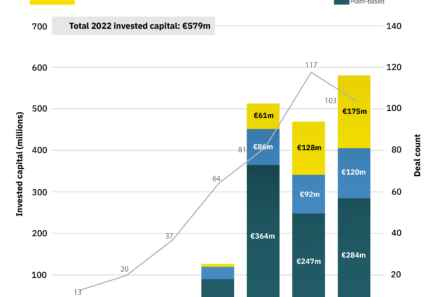Sustainable proteins in the United Kingdom
Your guide to the business, science and policy of plant-based and cultivated meat in the UK.

The UK’s sustainable protein opportunity

Becoming a scientific superpower
The UK is home to leading food and biotechnology firms, and four of the world’szehn besten Universitäten der Welt. The UK Government sees Britain’s leading scientific research and innovation as central to growing the economy, with UK Research and Innovation endowed with a record-breakingbudgetof more than £25 billion. With the recentresponse to the National Food Strategycommitting £120 million in spending on research across the food system, there is an enormous opportunity to make the UK a world leader in plant-based meat, cultivated meat and fermentation.
Globally, sustainable proteins are still at the beginning of the R&D curve, but the sector is advancing very quickly. The country that discovered penicillin, developed the jet engine and created the world wide web should be at the leading edge of scientific advances in sustainable proteins – not sitting and watching from the sidelines.
Achieving net zero
Plant-based and cultivated meat can provide the British public with the familiar foods they love, at a fraction of the environmental cost.
Plant-based meat production emitsup to 90% less greenhouse gas emissionsand uses up to 99% less land than farming animals. When produced with renewable energy, cultivated meat couldcut the climate impact of meat by 92%and use up to 95% less land.
The Climate Change Committee calls forUK meat consumption to fall by 35%in order to achieve net zero emissions by 2050 – and the National Food Strategy found that replacing processed meats with plant-based and fermentation-made options could achieve a20% cut by 2030. Investing in accelerating these more sustainable ways of producing meat would enable the UK to bring its food system into line with its climate commitments, without telling people what to eat.

Building back better
With public investment to scale up production, plant-based and cultivated meat can be made in any part of the UK – levelling up regional economies, creating green jobs and producing local food.
Research funded by the UK Foreign, Commonwealth and Development Office has found that public investment in diversifying our protein supply could add$1 trillion to the global economyand create 10 million jobs.A study by Oxford Economicssuggests that the cultivated meat industry alone could add over £2 billion to the UK economy.
Priorities for UK policymakers
Establish a strategy to make the UK a global leader in the sustainable protein space
In order for the UK to take a leadership role in this space, the UK Government should:
- Urgently develop a Sustainable Protein National Strategy, with a view to building a favourable and dynamic research, regulatory and industry ecosystem for sustainable proteins between now and 2027.
- Appoint a national sustainable protein coordinator to oversee the implementation of this strategy and ensure coordination between all relevant governmental departments.
Invest in open-access research and development
Public investment fills a very different role than private sector investment. Unlike companies, which have an incentive to protect their research and innovation and seek individual return on investments, public funds can be invested into long-term, forward-looking R&D questions that can accelerate entire industries. As has already happened in the field of renewable energy, governments can play a unique role by prioritising open-access R&D funding that ensures the benefits can be democratised, further catalysing innovation across the whole sector.
At the highest level, the UK Government should pursue a three-pronged approach of:
- Earmarking at least £225 million in funds for investment into sustainable proteins between now and 2027.
- Ensuring a significant proportion of these funds are directed into the open-access research needs for sustainable proteins
- Channelling more funding than is currently available into the food system transition.
Concretely, the Government should take the following immediate steps:
- Earmark at least£100 millionto fund academic research. These funds should be used to:
- Fund BBSRC, EPSRC, and Innovate UK callsdedicated to sustainable protein research.
- Establishing sustainable protein departments in high potential universities, allocating funds for new grant programmes and to modernising university labs.
- Annual funding for scientific community building, such as grants for funding research networks and conferences.
- Earmark at least £125 millionfor R&D for commercial development and infrastructure scale-up. Specifically these funds should be used to:
- Establish anInnovation Cluster dedicated to accelerating the R&D development and commercial applicability of sustainable proteins.The centre should act as an accelerator between the public and private sectors, bringing together researchers, universities and companies, while maintaining a global perspective. This should be backed by at least £50 million in funding.
- Allocate £75 million in grants to start-ups, as recommended by theNational Food Strategy.
- Leverage the Agri-Tech Centresto drive forward progress by developing specific calls on plant-based and cultivated proteins and bringing discussion on sustainable protein crops into the work of the Agri-EPI Centre, CIEL, and CHAP.
For a more detailed breakdown of our R&D recommendations for the UK, please see ourbriefing.
Ensure there is a fair and robust regulatory path to market
For plant-based and cultivated meat to fulfil their potential to create a more secure, sustainable and just food system, consumers need to be confident in the food they eat. Currently in the UK, many sustainable protein products will fall under specific regulatory frameworks for the approval of novel foods and – in some cases – GM foods.
Given the early stage of development of the sustainable protein sector, the UK Government should prioritise ensuring a clear and efficient regulatory approval process for innovative plant-based, fermentation-made and cultivated proteins to come to market. This is critical to ensure that regulation enables sector innovation in the UK while at the same time ensuring that sustainable proteins fulfil the highest food safety standards.
The process for obtaining any required premarket approvals, as well as the requirements of ongoing regulation (safety testing, inspections), should be science-based and include specified timelines for review. As a general principle, the safety of the final product as consumed should be the primary consideration.
Invest to ensure a dynamic industry ecosystem
植物和栽培肉类产业BOB体育投注网址scale up in the UK, sufficient access to capital is essential for companies to be able to make the investments needed in manufacturing facilities, equipment and operating expenses. Today, the shortage of processing and production capacity is one of the most limiting factors holding back the growth of the industry.
Although venture capital has fuelled the industry to date, this model is not suited for capital-intensive fixed assets like processing and production facilities, which have longer payback periods and lower annual expected returns. It will therefore become increasingly critical to generate investment from sources that have the ability to deploy significant amounts of capital and are willing to provide opportunities to utilise non-traditional financial instruments.
The UK Government should:
- Provide loan guaranteesto mitigate risks for lenders, an approach that has successfully been used in other sectors like clean energy. This would enable the sustainable protein industry to receive debt financing from banks and other institutional investors that normally do not make loans to higher-risk entities.
- Provide funding for the establishment of sustainable protein production facilities, potentially by providing incentives to repurpose from other industries and/or from offline manufacturing.
- Increase availability of grant funding for sustainable protein startupsto provide non-dilutive funding options.
- Establishgrant programmes or prize incentivesto develop supply chain solutions to address projected future bottlenecks (for which there is otherwise no current economic incentive to begin that R&D).
- Create a fund to offer leasing and financing of the equipment and facilities植物肉公关所必需的oduction, such as extruders. Enabling manufacturers to lease needed production equipment would allow them to replace high-cost, episodic capital expenditures with lower-cost, predictable operating expenses.
UK sustainable protein company database
The UK is already one of the biggest markets for sustainable proteins in Europe, with sales worth almost£640 million in 2020. Private investment is also soaring – with British companies raising£41 million in 2020and almost £38 million in 2019 – making up over 90% of the £86 million raised in the UK since 2006.
But with demand continuing to outstrip supply, and plant-based and fermentation options representing a tiny fraction of the overall meat market, further investment will be crucial to realise the full potential of these foods.
Use our database to explore the landscape of British plant-based, cultivated meat and fermentation companies. This tool will help you stay up to date on new companies and products in the space, find a manufacturing partner, or identify groundbreaking startups.








